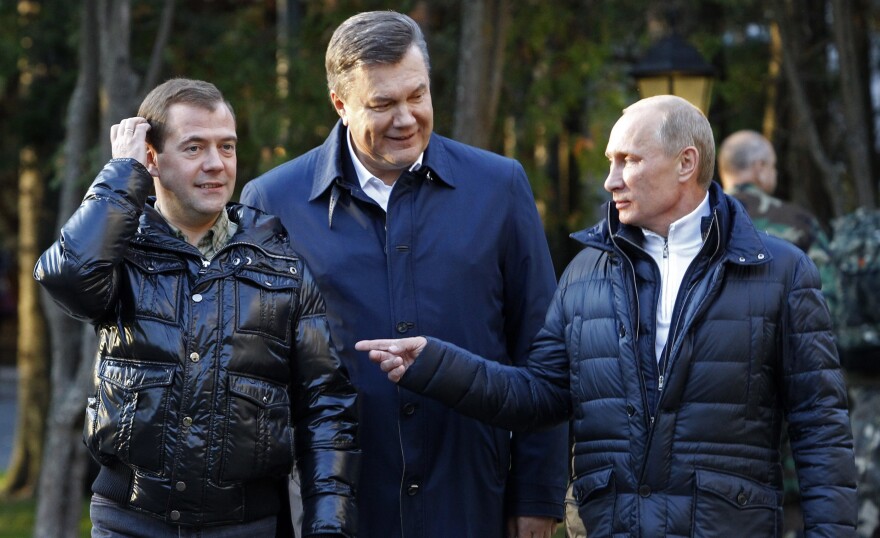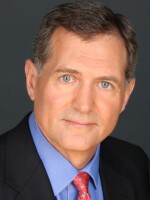Russia's military intervention in Syria is intended as a lifeline for Syria's beleaguered President Bashar Assad. Yet the Kremlin's track record on bailing out floundering leaders is largely a litany of failure.
Over the past quarter-century, Moscow's proteges, clients and allies have often lost power, and sometimes their lives, despite Russia's military and political patronage.
For the first time since Syria's war erupted in 2011, Assad traveled outside his country and met in Moscow on Tuesday with Russian President Vladimir Putin in a meeting that wasn't revealed until Wednesday.
"We are ready to make our contribution not only to the military operations and the fight against terrorism, but also to the political process," Putin said during the meeting, according to a transcript released by the Kremlin.
Russian war planes have been bombing rebel groups in Syria the past few weeks, giving Assad a boost, at least in the short term.
The Russian operation is seen as part of Putin's larger mission to reverse the post-Soviet decline and give Moscow a larger presence on the world stage. Last year, he sent Russian forces into Ukraine, where they seized and annexed Crimea and have assisted rebels in the eastern part of the country.
These Russian adventures are seen by some as bold, decisive action that strengthen Moscow's position in both regions while the U.S. and Europe dither.
But built into this critique is the assumption that Russia will benefit from these military actions in the longer term: that Russian control and influence in impoverished parts of Ukraine are assets that outweigh the liabilities of sanctions and ostracism by the West, and that Assad will ultimately prevail in Syria's tangled war.
Yet both conflicts have many potential outcomes. Bold, decisive action today might, a few years down the road, look more like the squandering of Russia's limited resources for a doomed cause.
Moscow has supported Assad, and before him his father Hafez Assad, since the 1970s, while maintaining a naval base on Syria's Mediterranean coast. Yet Assad family rule in Syria has never been more precarious.
Asked about Putin's decision to plunge into the Syrian war, President Obama put it this way:
"Syria was Russia's only ally in the region. And today, rather than being able to count on their support and maintain the base they had in Syria, which they've had for a long time, Mr. Putin now is devoting his own troops, his own military, just to barely hold together by a thread his sole ally," Obama told 60 Minutes.
Russia has intervened politically or militarily many times in recent decades, and here's a look at how those interventions played out for the leaders Moscow was trying to help.
Afghanistan's Najibullah: The 1979 Soviet invasion of Afghanistan encountered stubborn resistance from Afghan rebels, and by 1987 it was clear Moscow needed a new approach. Moscow's answer was to install a new Afghan leader, Najibullah (who used just one name), the former head of the Afghan secret police. But it was far too late.
The Soviet troops pulled out in 1989. Najibullah clung to power until 1992, before he was ousted and took refuge in the United Nations compound in Kabul. He remained holed up there for four years until the Taliban captured the capital in 1996.
One of the Taliban's first acts was to seize Najibullah and drag him through the streets from the back of a truck. His lifeless body was then hanged from a lamppost in Kabul. The Russians have never been welcomed back in Afghanistan.

Yugoslavia's Slobodan Milosevic: In the name of Slavic brotherhood, Russia provided extensive political and moral support to Milosevic during the vicious wars that ravaged the former Yugoslavia during the 1990s.
Russia continued its defense of Milosevic long after his international support evaporated and he was blamed for some of the worst abuses in the multiple wars in the Balkans.
Despite Moscow's support, Milosevic was ousted at the ballot box in 2000. The new government arrested him and sent him to The Hague the following year. He died there in his prison cell in 2006 while on trial for genocide and crimes against humanity.

Ukraine's Viktor Yanukovich: The Ukrainian leader had very warm relations with Russia during his presidency from 2010 to 2014. Yet his country was deeply divided over whether to align itself more closely with Russia, a traditional Slavic ally, or with Western Europe, which offered the possibility of greater economic development.
In response to Ukrainian critics who said he was too close to Russia, Yanukovich replied, "It is not wise to fall asleep next to a big bear."
This internal Ukrainian dispute came to a head in the fall of 2013 when Yanukovich rejected closer trade ties with the European Union and opted for a counteroffer from Putin, who wanted to keep Ukraine within the Russian orbit.
That touched off mass street protests that led to Yanukovich's ouster in February 2014, when he fled to Russia. Many Ukrainians called it a popular revolution while Russia described it as a coup.
Shortly afterward, Putin sent Russian forces to take Crimea. Yanukovich, who was blamed for the deaths of protesters and accused of massive corruption, filed suit this week accusing Ukraine of violating his human rights.
Meanwhile, the war in Ukraine is not going nearly as well as Putin planned, according to analysts Adrian Karatnycky and Alexander J. Motyl, writing in Foreign Policy.
"The Kremlin's war in Ukraine is turning into a quagmire. Militarily, it is a stalemate," they say. "Economically, the war and occupation of both Crimea and the Donbas [eastern Ukraine] have imposed ruinous costs on Russia. ... In sum, Putin's plans of weakening Ukraine have backfired."
The Chechnya Exception: Not every Russian client has come to a bad end. The most notable exception is Chechnya's leader, Ramzan Kadyrov, who maintains an iron grip on the southern Russian republic.
Yet Chechnya is a special case. The territory has a long history of rebellion against Moscow yet remains part of Russia, giving Moscow an unlimited ability to act.
The Russian military pounded the relatively small territory in two separate wars, one from 1994-96 and the other from 1999 until the late 2000s. Ultimately, the Chechen separatists were beaten down at a huge cost.
And Kadyrov has his own complicated relationship with Moscow.
Kadyrov and his father were both part of the rebel opposition to Moscow in the 1990s, declaring jihad on Moscow. But they eventually changed sides. The father, Akhmad Kadyrov, became president of Chechnya but was assassinated in 2004. The son, who assumed the top post in 2007, has been accused of widespread human rights abuses.
Russia's leadership likes to boast of Chechnya as an example of a triumph over "terrorism." As Prime Minister Dmitry Medvedev said last year, Chechnya is "one of the business cards of Russia."
Greg Myre is the international editor at NPR.org. Follow him @gregmyre1.
Copyright 2021 NPR. To see more, visit https://www.npr.org.




